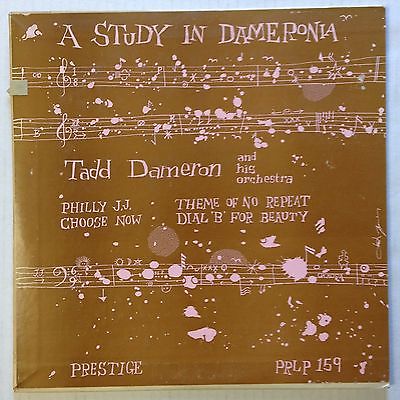Tad Richards' odyssey through the catalog of Prestige Records:an unofficial and idiosyncratic history of jazz in the 50s and 60s. With occasional digressions.
Tuesday, March 03, 2015
Listening to Prestige Records Part 88: Tadd Dameron / Clifford Brown
Here we have a powerful ten-piece band, with an all-star amalgam of musicians, but two of them stand out for special mention: Tadd Dameron, who was one of the most influential composer-arrangers of the bebop and hard bop eras, and whose name is legend to other musicians, but who remains a cult figure to the general listening public; and Clifford Brown, whose star blazed brightly for a very short time, bookended by terrible auto accidents, the second of which took his life.
June of 1953 was the time when Brown made his first powerful mark on the jazz recording scene. He had made a few records the year before, some rhythm and blues in Chicago with a group led by Chris Powell (no relation to beboppers Bud and Richie Powell), and a session of bebop standards, including "A Night in Tunisia" and "Donna Lee," recorded live at a club in Philadelphia, where Brown spent some important early years. Because his career was so short, and his recorded output so much less than it might have been, all of his work, including these early sessions, has been reissued. You can find the R&B sides, which are striking, and the Philadelphia club tapes, which are amazing, on a Columbia reissue album called Clifford Brown: The Beginning and the End. Brown was 22 when he made these recordings, which is young, but his career had actually been held back by a debilitating injury suffered in an auto accident in 1950.
He hit the recording studios of New York in June of 1953, with a prodigious series of sessions. On June 9, he recorded with Lou Donaldson, Elmo Hope, Percy Heath and Philly Joe Jones for Blue Note, and two days later he was back in the studio with the Tadd Dameron group. Later in the month, he was back for another Blue Note session with J. J. Johnson, Jimmy Heath, John Lewis, Percy Heath and Kenny Clarke.
Tadd Dameron arranged for arranged for Count Basie, Artie Shaw, Jimmie Lunceford, Dizzy Gillespie, Billy Eckstine, Milt Jackson and Sarah Vaughan, among others, and he composed some of bebop's most enduring standards. He did record several albums as a leader, but they haven't all survived. This one can't be found on Spotify or YouTube with a search under Dameron. Spotify has it as part of a collection called Clifford Brown Memorial.
And Clifford Brown deserves to be remembered as vividly as he is, for a blazing career that lasted only until 1956. But Tadd Dameron deserves to be remembered also, and this session shows why. He knew how to showcase Clifford Brown's amazing talent, but he knew how to write and arrange for a jazz orchestra, too, as well as anyone ever did. Count Basie, similarly, could make a great soloist like Lester Young simultaneously part of and separate from an ensemble.
Bebop was a soloist's art form. Gerry Mulligan was in demand as an arranger in jazz circles, but he didn't emerge as a star until he stepped out front as a soloist. Conversely, Count Basie almost never soloed, but he came from an era, and a musical genre, in which the bandleader was king. Dameron actually takes some solo space here, and he sounds great -- but not a lot.
All the compositions here are Dameron's. Of his composing style he has said (quoted by Ira Gitler in his liner notes), "When I write something it's with beauty in mind. It has to swing, sure, but it has to be beautiful."
These were released as a 10-inch LP entitled A Study in Dameronia (cover art by David X. Young), and on an EP as Clifford Brown with Tadd Dameron's Band. There was a later reissue called The Arranger's Touch that featured work by Dameron and Gil Evans, but mostly the reissues have been under Brown's name.
Subscribe to:
Post Comments (Atom)



1 comment:
Tadd's solo on "Theme of no Repeat" is superb - suggestive of both Monk (line) and Powell (block chords), but remarkably all his own - with swinging support from Percy Heath and Philly Joe.
Post a Comment